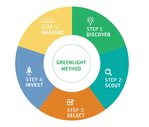

By CHLOE PETER
In fifth grade, Simone Hardeman-Jones was asked to identify a social problem and identify a solution. She chose to have her classmates and community help her in writing letters to a company that sold baby formula in developing countries. The formula needed clean water to be safe for the babies, but that was difficult for mothers living in poverty to access. She felt that, in sending letters and making her voice heard, she could have a powerful impact on the world.
Hardeman-Jones said that this led to her career in community activism. When she was offered the position of executive director at Greenlight Fund Twin Cities, she accepted.
GreenLight Fund is a national nonprofit with a local focus that partners with communities to create opportunities for inclusive prosperity. Each year, the fund is focused on identifying one critical, unmet community need, and begin to take specific action against that to make real change.
“We seek to elevate our community’s knowledge and lived experience through our community-driven process which centers on elevating persistent local needs not being met by existing services, programs, or organizations,” Hardeman-Jones said.
In fall of 2020, GreenLight Fund Twin Cities began engaging in its annual community engagement process by connecting with local leaders and residents to understand the prevalent issues of today and gaps in services that exist. They created a local Selection Advisory Council (SAC) to guide how and where GreenLight will focus energy and resources. In partnership with the SAC, and through many conversations with community leaders and residents, GreenLight chose community safety as a focus area for the year. This began the investment in Let Everyone Advance with Dignity Minneapolis (LEAD).
“The collective goal is to decrease recidivism and improve stability and outcomes for those facing behavioral health challenges often criminalized in our current systems,” Hardeman-Jones said.
LEAD Minneapolis is a public health approach to community safety that works with individuals cycling in and out of the legal system and gives the option of working with a case manager on a long-term basis. Case managers utilize a harm reduction, trauma-informed approach in building relationships with LEAD participants to support them in their individually identified goals.
Whether it is a need for support getting one’s birth certificate so that they can apply for a job or a need for a hot meal one night, case managers are there with participants every step of the way for as long as they need support. This initiative is held by community with its collaborative implementation structure bringing a cross section of community leaders, neighborhood residents, business owners and government officials together in partnership with case managers.
“As we connected with leaders in the Lake Street Corridor, we heard loud and clear that now is the time to de-center law enforcement and center the community in our efforts to reshape public safety,” Hardeman-Jones said.
LEAD Minneapolis will focus on the Lake Street Corridor. With the relationships built with their case managers, LEAD participants will have a higher chance of finding mental health services, substance abuse support, housing, and employment than they would trying to navigate the system on their own. With over 50 participants in LEAD Minneapolis by midsummer 2023 growing to 200+ in the Twin Cities over the next four years, this program will lower recidivism by 50%, increase social support by 35% and improve relationships with residents, law enforcement, business owners, and many more.
“We know that business owners and community members along Lake Street are in daily contact with potential LEAD participants and know that these individuals often just need support denied to them in a system that focuses on punishment rather than support,” Hardeman-Jones said.
LEAD is rooted in a harm reduction approach, allowing people to receive support that they are ready for and also allowing people to take their course of healing with the understanding that progress isn’t linear. Individuals will never graduate from the LEAD program. If someone feels like they are doing well enough to stop seeing their case manager after three months and then find themselves in a crisis six months later, they are always able to call their case manager and receive support. More information on how to help LEAD and GreenLight Twin Cities can be found at https://greenlightfund.org/sites/twin-cities/.
“Through understanding some of the root causes of why people are struggling rather than tying them to a legal system that wasn’t designed to meet people where they are, see their humanity and get to the root of any issues they may be struggling to overcome,” Hardeman-Jones said.
2 comments on this item Please log in to comment by clicking here
Lisaswan
Is
Friday, August 5, 2022 Report this
Lisaswan
Is this similar to Restorative Court? Or is this a completely voluntary program? And how is engagement measured--a certain number of meetings or is there follow up to measure specific outcomes?
Friday, August 5, 2022 Report this